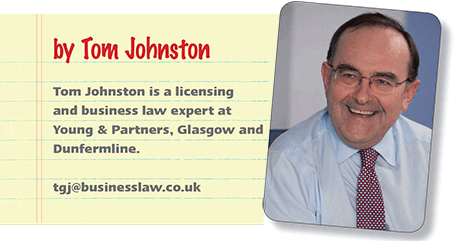You may love retail, you may have an excellent store but things can change – so structure your business to protect your personal life

NO-ONE likes to think that their business could go under. Many think that only the stupid or the feckless allow that to happen. Unfortunately, experienced business lawyers see all too often problems which arise through sheer bad luck. I’ve been advising convenience store owners for over 30 years and have just about seen it all. My advice is, be prepared for every eventuality.
Picture this perfect storm. There’s increasing encroachment into the convenience store market. One day you wake up to find a Tesco Express and Sainsbury’s Local both within a quarter of a mile. The council decides to close the local school. Disused mine works are discovered under the nearby housing estate and 100 homes are evacuated. I could add more horrors, but you get the picture. Would your business survive? More fundamentally, if your business is no longer sustainable what effect would that have on you and your family?
It never ceases to amaze business lawyers why so many retailers who take such good care of their customers leave themselves wide open. Retail these days is high-risk. If you are a sole trader, a husband and wife firm or a family partnership, everything you have worked for all of your days could be under threat. Your creditors could seize your personal bank accounts and make you sell your house. If you are made bankrupt, or sequestrated to use the technical term, it may be impossible for you start again, as you will not be able to get any credit, even after you have been discharged.
No sensible person drives a car without a safety belt – so why not ensure your business structure offers you a degree of protection? Various options are available, the most common being a limited company or limited liability partnership (LLP). Both have their pros and cons. There are different taxation provisions for each – expert advice is required. What they both have in common is that, provided they are properly set up, they will separate business assets from personal ones. If your company goes down through no fault of yours, you can start again, with your personal assets untouched.
If you have bank borrowing, or if you rent premises, you may have to give some sort of guarantee. You should always ensure there is a cap on this and negotiate terms specifying when the guarantee will be lifted. At present landlords are desperate for good quality tenants; if your lease is up for renewal and you have paid your rent promptly in the past, seek to get rid of any guarantee as a condition of renewal. If you need bank facilities, you probably can’t avoid giving them something, but you can protect yourself from falling foul of HM Revenue & Customs.
Do remember to get proper legal advice. Don’t cut corners by buying off the shelf unless you know how to prepare all the paperwork. If you have a limited company but overdraw your directors’ account, you may have to pay this back, negating the benefit of the limited liability. If in business with others (family included), give thought to what should happen in the event of a falling out, or if someone wants to move on to do other things. This is easily regulated by a shareholders’ agreement or LLP agreement. The cost of getting it right at the outset is a tiny fraction of the potentially huge cost of dispute resolution.
If in business with others (family included), give thought to what should happen in the event of a falling out, or if someone wants to move on to do other things. This is easily regulated by a shareholders’ agreement or LLP agreement. The cost of getting it right at the outset is a tiny fraction of the potentially huge cost of dispute resolution.
Let’s hope that you never encounter the doomsday scenario. But if you do, won’t it be much nicer if you still have a home to go back to?












